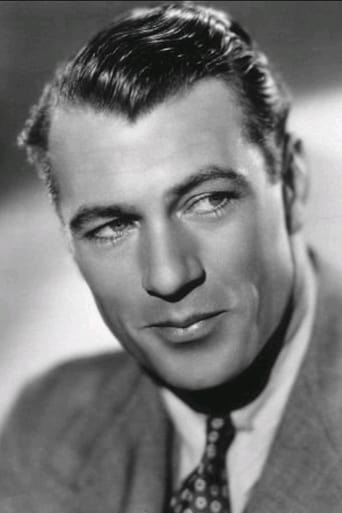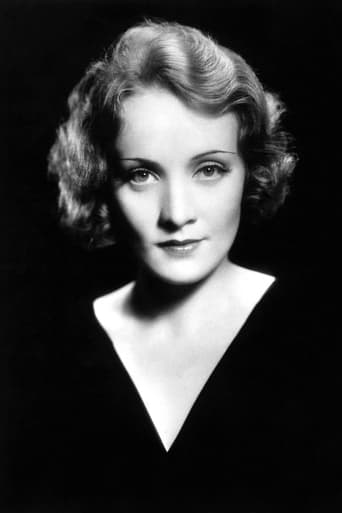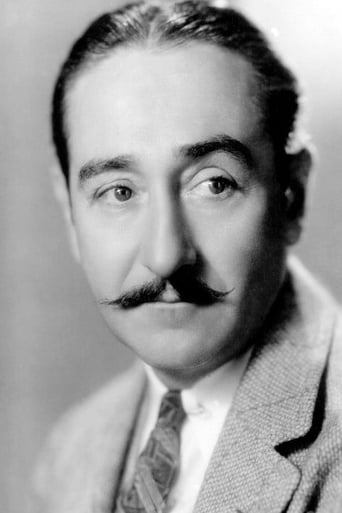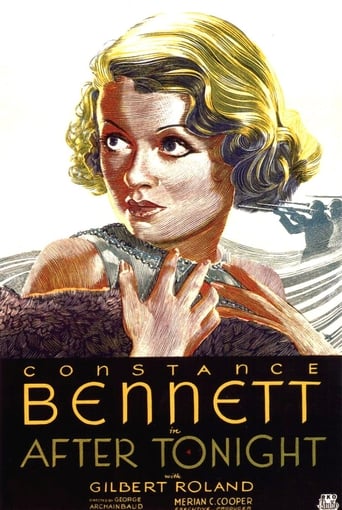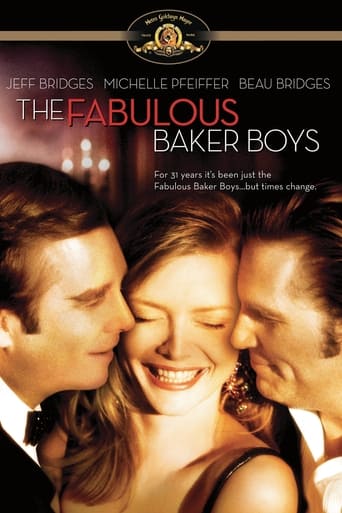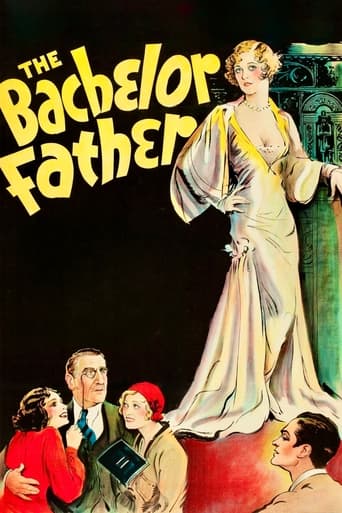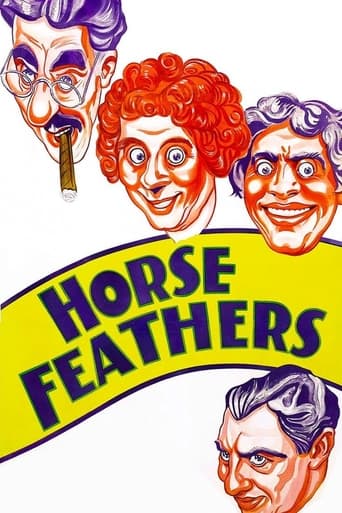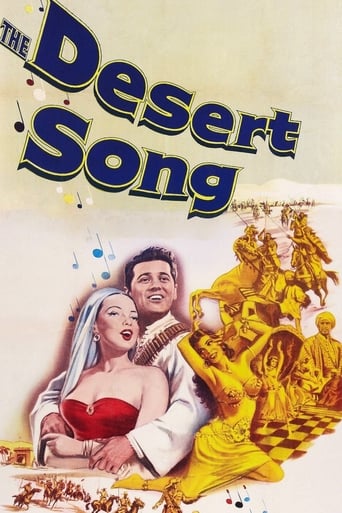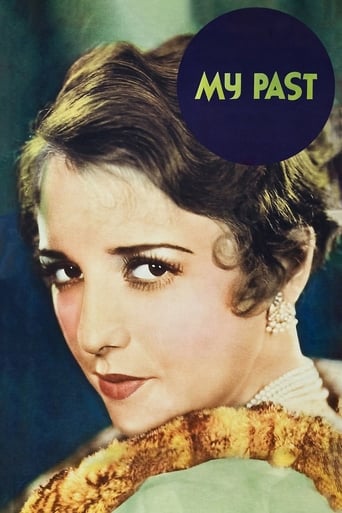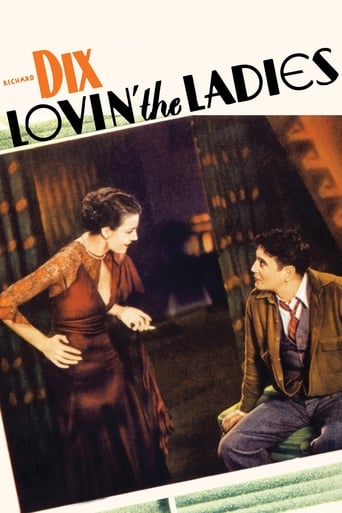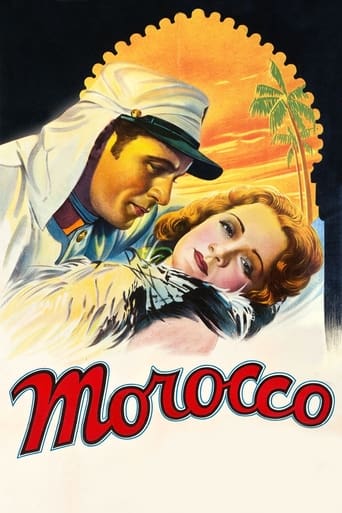
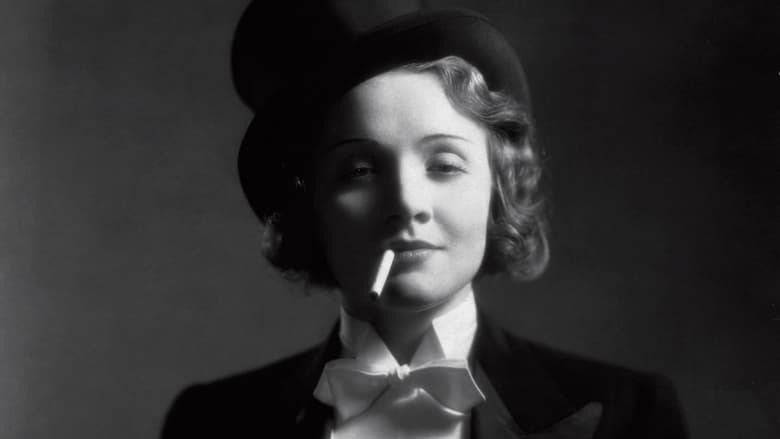
Morocco (1930)
The Foreign Legion marches in to Mogador with booze and women in mind just as singer Amy Jolly arrives from Paris to work at Lo Tinto's cabaret. That night, insouciant legionnaire Tom Brown catches her inimitably seductive, tuxedo-clad act. Both bruised by their past lives, the two edge cautiously into a no-strings relationship while being pursued by others. But Tom must leave on a perilous mission: is it too late for them?
Watch Trailer
Cast
Similar titles
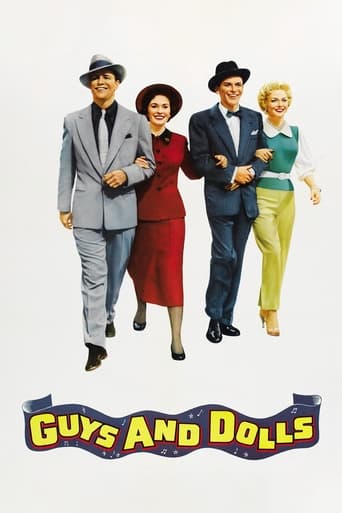
Reviews
One of my all time favorites.
best movie i've ever seen.
Ok... Let's be honest. It cannot be the best movie but is quite enjoyable. The movie has the potential to develop a great plot for future movies
It is an exhilarating, distressing, funny and profound film, with one of the more memorable film scores in years,
Morocco was Marlene Dietrich's American film debut and it was directed by Josef von Sternberg.Made before the time of the Hays Code. Dietrich's appearance in a cabaret wearing a suit and a top hat was an alluring image, so was her kiss to another woman. The film also has slight nudity of a desert woman.Dietrich was Oscar nominated as a sultry sexy cabaret performer who is desired by two men. Gary Cooper has joined the French foreign legion, running away from something he puts his life in danger fighting in the Moroccan desert.Adolphe Menjou is a suave wealthy suitor who truly loves Dietrich even if he believes underneath that he might lose her to Cooper.The film made in 1930 is rather creaky, slow moving and does not contain much of a story.
desert. a cabaret actress. a legionnaire. the force of love who change everything. one of legendary films who remains memorable for the high science of Dietrich to explore , use and impose each detail who could define her character. a bitter show with provocative sexuality, seductive dialogues , Gary Cooper in a role who translates profound honesty of performance, landscapes who remains impressive, a simple convincing story who remains touching for the wise art of a great director to remind more than presents. a first step of Dietrich in a new circle. the support of director and partners. the courage to use taboo for a fascinating show. nothing spectacular. only precise in admirable manner.
After making remarkable naturalistic masterpieces as "Underworld", "The Docks of New York" and "The Blue Angel", Josef von Sternberg made "Morocco", but instead of the rigorous visual and thematic baroquism that worked so well in his own "The Last Command", he opted for the cheap Hollywood exoticism of long cinematic tradition, before and after this African adventure. First of the American films he made with Marlene Dietrich, "Morocco" is one of those heavily static products made during the first years of sound cinema, when the use of the new equipments was shy, and registering sound prevented cameras from moving as freely as they did during the silent period. But aside these technical restrictions, "Morocco" is a melodrama in the limits of idiocy, with a sure foot on the land of ridiculousness; it is a cult film more than anything else, with Marlene flaunting boas and male attire, sending lesbian messages and singing nonsense, while a young and bony Gary Cooper and Adolphe Menjou in his typical Frenchified impersonation, revere her, as those who selected this dubious entry to the National Film Registry. Watch it only as curio.
Marlene Dietrich's first American film (at this stage, her Paramount contract stipulated that only Sternberg could direct her!) remains, despite its understandably faded air after 8 decades, one of her greatest (in his hefty tome "Have You Seen ?", eminent but provocative movie critic David Thomson called it "one of the most influential films Hollywood ever made"!). She proved an instant hit, even copping a personal Oscar nod – the only time the legendary actress would be so honored in a long and illustrious career! For the record, MOROCCO was also nominated for Sternberg's sturdy direction and Lee Garmes' gleaming cinematography (most notable when shooting through the exposed roof-racks, in the narrow passageways of the Casbah-like town and tracking along the seemingly endless line of departing legionnaires bidding goodbye to their women).In hindsight, it is interesting that the first 3 Sternberg/Dietrich pictures to be released in America were made within the framework of action-oriented genres – a Foreign Legion/desert adventure here (not that we really get any of the expected skirmishes along the way!), WWI espionage (in DISHONORED {1931}) and a train-set, multi-character revolutionary epic (in SHANGHAI EXPRESS {1932}). As with many of the films in the series, too, she forms part of a love triangle with her co-stars which, in this case, offered possibly the best pairing of all: Gary Cooper (top-billed, in a role originally intended for either John Gilbert or Fredric March, as an unruly young legionnaire – in fact, he is also involved with a number of other women throughout, including the wife of his commanding officer!) and Adolphe Menjou (older but typically suave and wealthy to boot, he naturally extends her a marriage proposal she very nearly accepts!).Dietrich arrives in Morocco (for the usual specialized spot at a cabaret – the film, in fact, was based on a play bearing her character's name i.e. Amy Jolly: brought to Sternberg's attention by Dietrich herself, it was a decidedly more explicit prospect, accentuating the lesbianism angle while also incorporating the copious intake of cocaine!) on the same boat as Menjou, who takes an immediate interest in her; she is not of the same opinion, however, and promptly rips and throws away his calling-card! The star performs two numbers in French (showcasing her Cosmopolitan identity) but also "What Am I Bid?", which she sings in drag (sporting top hat and tails!) and, making her way round the audience as she does so, eventually plants a controversial kiss on a blushing local girl's lips! One night after visiting Dietrich at her place, an assassination attempt is made on Cooper's life, which she ends up witnessing; in the ensuing military hearing, it is obvious the hero's superior intends making him pay for the dalliance with his wife, but his plan of sending Cooper on a suicide mission rebounds on himself as, accompanying him to make sure he does not return, it is the officer who succumbs to an enemy bullet!The film provides a rare display of the Surrealist concept of amour fou in Hollywood's Golden Age (such another was Henry Hathaway's PETER IBBETSON {1935}, also with Cooper, which would actually be championed by cinema's foremost exponent of the form, and my own favorite auteur, Luis Bunuel!): Dietrich compulsively abandons Menjou, halfway through an ennui-ridden society dinner, upon hearing the arriving legionnaires; accompanied by her now-resigned protector, she frantically searches for the reportedly wounded Cooper (but is unable to track him down, having been made a prisoner in the interim); ultimately, the female protagonist follows her true love – along with other similarly devoted women, known as "camp followers", and whose apparently irrational act she had earlier found perplexing – on his next patrol (making for a prolonged final shot, which is among the most memorable of the early Talkie era). By the way, on the strength of this (which I had watched twice on Italian TV over the years since, bafflingly, it was never issued on VHS in my neck of the woods!), I acquired the reputedly routine George Raft vehicle OUTPOST IN MOROCCO (1949; a film I do recall missing out on when shown on local TV in the 1990s).
